Peter MALONE
Saturday, 18 September 2021 19:53
Smoke Signals
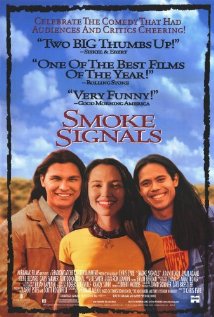
SMOKE SIGNALS
US, 1998, 89 minutes, Colour.
Adam Beach, Evan Adams, Irene Bedard, Tantoo Cardinal, Gary Farmer.
Directed by Chris Eyre
Victor (Adam Beach) and Thomas (Evan Adams) live in a culture which has impoverished the spirit of Native Americans. Their pilgrimage to recover the body of Victor’s father, Arnold Joseph, is an act of piety that redeems Victor, enabling him to grow as a person and to care for his mother.
The two young men at the centre of Smoke Signals have a wry conversation about the movies which show the clash between the whites and the Indians and about Indians watching them. This Hollywood lore began to change around 1950 but the deprivations of land and culture that the Indians experienced are still a significant part of the heritage. The young people joke about having a passport to leave the reservation, about getting their shots to go into a foreign land, the United States.
One of the greatest deprivations was the warrior’s loss of status and of traditional work. Arnold Joseph is the embodiment of this. He has no fixed job, he drinks, he leaves his family, he dies in exile. We finally discover that he was responsible for the fire that killed his friends. His son, Victor (whose name means a winner), remembers his love for his father, but clings to his bitterness about his abandoning him and his mother. It is only when he makes what becomes a pilgrimage to his father’s caravan, listens to Susan, who had befriended Arnold Joseph, and understands that his father truly loved him that he is able to be himself.
Forgiveness is the task for Victor, culminating in scattering his father’s ashes in the river. Despite the fact that Thomas’ stories drive him to distraction, he is lucky to have Thomas as friend, benefactor and wise fool. Thomas’ voiceover shows the positive side of those who are poor in spirit. Thomas has a complex simplicity. He knows how Arnold Joseph saved his life and befriended him. He knows the qualities of both Arnold and Victor and is the catalyst for Victor being able to come to terms with his past and look forward to a positive future.
One of the important parts of Victor’s future is his care for his mother. Thomas is able to say truly that an important part of his happiness is caring for his grandmother who is always eager (as she is at the very end of the movie), to welcome Thomas and listen to his stories. Arlene Joseph, on the other hand, has suffered the loss of her abusive husband. Victor is there but, as Thomas tells him, he is not there in spirit. At the end, Victor can truly love and support his mother.
1. Native American story, characters, traditions, issues?
2. Idaho, the Indian reservation, homes, the town, the roads? The American countryside in the West? Arizona? The musical score?
3. The title, Native American communication? The film offering signals?
4. The importance of storytelling, the oral tradition? Tommy and his frequent stories, his skill, his memory, enhancing memory, the images, the narratives? His discussions with his grandmother? His telling stories to Victor, Victor’s reaction, negative? The girl asking for a story before giving a lift? The elements and power of the story, her acceptance? Mentioning the oral tradition? Tommy telling stories to Victor on the way? To Susan in Arizona? The whole film and its storytelling?
5. The voiceover, the initial fire, its intensity, the later explanations as to the accidental setting fire, Arnold Joseph and his drinking, with his wife, the fire, the people trapped, the baby thrown from the upper room, Arnold Joseph catching it? The grandparents looking after the children?
6. Victor and Tommy as adults, the vastly different types, the up and down friendship, clashes, Victor and his exasperation, Tommy and his continued intensity? Issues of appearance, Tommy and his plaits, Victor urging him to change and be a man?
7. The flashbacks, the boys, play, always clashing, school, within the families, Victor and his mother and the baking of the excellent bread?
8. The flashbacks, to Arnold Joseph, his drinking, treatment of his wife, his anger, his pride in Victor and the basketball sequence? His explaining that to Susan and her telling Victor?
9. Arnold Joseph and his farewell to Victor, love, going to Arizona, disappearance? News of his death? The information, Victor and his quest, going to get his father’s remains, a mission?
10. Tommy, wanting to go, offering Victor the money, Victor reaction, their going, getting the lift, on the bus, Tommy’s incessant stories, the white men taking their seats and the clash but their backing down? The racism? Arrival, their walking to the trailer park, Victor throwing the water away, the clashes? Arrival, finding Susan?
11. Victor, wanting to go, Tommy wanting to stay, have something to eat? The comments on the bread? Susan and her work at the hospital? the discussions, going to the trailer, the flashback of Arnold Joseph dead, Susan finding him? Cremation, the container with the ashes? Susan talking, telling Victor stories about his father, the memories of the basketball throw – the fact that Victor actually missed? His changed attitude?
12. Susan, herself, her work, friendly, supportive of Arnold Joseph?
13. Getting the truck, the return, discussions with Tommy, especially Tommy’s memories of sitting by the river, their wanting to go there, stopping, scattering the ashes?
14. Victor dropping Tommy at home, Tommy and his grandmother and resuming his life? The effect of the trip?
15. Victor, his mother, the ashes?
16. A different road movie, experience, life-changing?
Published in Movie Reviews
Published in
Movie Reviews
Tagged under
Saturday, 18 September 2021 19:53
Trip to Bountiful, The/ 2013

THE TRIP TO BOUNTIFUL
US, 2013, 100 minutes, Colour.
Cicely Tyson, Blair Underwood, Vanessa Williams, Keke Palmer, Clancy Brown.
Directed by Michael Wilson.
The Trip to Bountiful began life as a play, was filmed in 1985, winning Geraldine Page an Oscar for Best Actress. The playwright was Horton Foote. He wrote many plays and screenplays including Baby, the Rain Must Fall and On Valentine’s Day.
Foote adapted his play for the stage after 25 years, making it a star vehicle for an African- American cast.
Cicely Tyson, impressive in so many films like Sounder, The Autobiography of Miss Jane Pitman, embodies Carrie Watts, an old lady living in Houston, yearning for her old house in the town of Bountiful. Her son, Ludie (Blair Underwood) has been ill and is in no mind for his mother to travel. The house is dominated by his wife, Jessie Mae, (Vanessa Williams).
One day, the old lady decides to go, taking a pension cheque, having to pay in coins for the bus trip only to find that there is no stop at Bountiful. Her son and daughter-in-law try to find her at the bus station. She has made friends with a young woman whose husband has gone off to war, Thelma (Keke Palmer).They talk together on the bus, each revealing the happiness of their lives, Carrie saying she never loved her husband but respected him.
When they arrive at Harrison, and Carrie recovers her lost purse, she wants to walk to Bountiful. The sheriff wakes her in the morning and she persuades him to take her to her home, walking the grounds, remembering, going inside – when her son arrives to take her home and she shares memories of his life with him. Jessie Mae is also there, continually self-centred and impatient, but the two women agree on some rules for future life at home and Carrie returns, satisfied that she has visited Bountiful, and her son admitting that he should have taken her there years earlier.
1. A classic story? Film version, stage versions, this television version?
2. Horton Foote and his stories of the South, screenplays, plays? The re-adapting his play for this television version?
3. An African- American version, cast, Cicely Tyson as Carrie?
4. Family, family portrait, joys and sorrows, regrets?
5. The date, World War II? The story of Thelma and her husband gone to war?
6. The locations, Houston in the 1940s, the city, homes, bus station, the countryside, the Gulf Coast, the dilapidated house? The musical score?
7. Carrie, age, health, trotting around, not being able to sleep, singing hymns, sitting on her chair? Yearning for Bountiful, the absence of 20 years, the memories of her husband, not loving him but having respect, Ludie as a boy, as a man, his illness, her care? Jessie Mae and her exasperation, self-focus, nerves, irritability, demanding, the effect on Ludie, Carrie?
8. Ludie, son, age, work, illness, time off, the domination of his wife, the new job, the interview, possibilities for promotion? Jessie Mae and her concern, Ludie refusing his mother the trip to Bountiful, sitting with her during the night, talking, the bond between mother and son?
9. Jessie Mae, wife of 15 years, place in the house, self-centred, controlling, her friend outside, quoting her, the drugstore, going to meet her, the preoccupation with the cheque?
10. Pension cheque, Carrie hiding it, the decision to go, the pretence of collapsing, going to the bus, the ticket with the coins, no stop for Bountiful? Meeting Thelma, friendliness, the talk, confiding? Ludie and Jessie Mae going to the station, asking Thelma, her telling the truth?
11. Sitting on the bus with Thelma, the talk about their marriages, illness love, Carrie’s respect? Thelma’s care for Carrie, getting off the bus and concerned about the purse?
12. The ticket seller and his exasperation? The bus driver and his shrugging the man at the depot, the talk, the lost purse, finding it? The arrival of the Sheriff?
13. The knowledge of Bountiful? 12 miles? Carrie waking, the sheriff, the phone call from Ludie, the sheriff’s decision to take Carrie?
14. Bountiful, the house, the town gone, the old track, the dilapidated house? The memories of the prosperous times? The effect on Carrie, going back in time, memories, feelings? Going inside? Ludie’s arrival, sharing with him, his admitting he should have done this before? Carrie reminiscing with stories
about him? Jessie Mae, her reaction, nerves and anger? Her four rules and both women agreeing to abide by them? Carrie giving Jessie Mae the cheque?
15. The importance of the Bountiful goal for Carrie, its effect on her, the consequences?
Published in Movie Reviews
Published in
Movie Reviews
Tagged under
Saturday, 18 September 2021 19:53
Midnight Man/ 2008
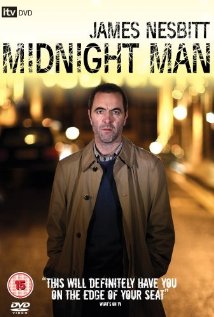
MIDNIGHT MAN
UK, 2008, 135 minutes, Colour.
James Nesbitt, Catherine Mc Cormack, Reece Dinsdale, Ian Puleston- Davies, Danny Nussbaum.
Directed by David Drury.
Midnight Man was screened as a three-part television miniseries. It is an interesting political drama, the city 2008 in London, remembering 9/11, the invasion of Iraq, the bond between the British government and the Bush Administration. The screenplay creates quite a conspiracy.
James Nexbitt is Max,a journalist whose career has been ruined by his giving a name of his source and her subsequent hanging herself. He now cannot go out during the day, hence the Midnight Man. The film shows his continued detection, given information about a government minister’s affair, rummaging through rubbish, finding documents and following up. In the meantime, the audience sees an abduction of a young Iranian man and his execution, as well as the executioners themselves who emerge as a special death squad, called The Fist of God.
There are some personal aspects, his alienation from his wife, his love for his daughter and their being in danger because of his work. He also consults a psychiatrist, played by Peter Capaldi.
Further investigations lead to a Think Tank, linked with Conservative politicians and American businessman as well as weapons production companies.
Robert Graves appears, very suave, as the head of the company. Catherine Mc Cormack is his assistant. Max challenges them, gets some support from, Alice, the assistant, makes contact with an old friend, another journalist, gets the help of a woman working in a club who had been a lawyer in Albania, pursues the wife of one of the killers.
There is plenty of action – and with some twists at the end.
The plot is relevant, even in years after the production of the film, where terrorist groups are targeted, and also financed, and Conservative powers want to create situations of tension so that business corporations continue to make money from weapons – even in the name of preserving Christian Western culture.
Midnight Man was directed by David Drury. His first film in 1986, Defence of the Realm, had political themes. His career has been principally in television.
1. Television film/series? British? Contemporary politics? Conspiracy theories, the media? Character study and thriller?
2. The title, as referenced in Max, only going out at night, his reasons, psychological state, guilt and memories? Overcoming his phobia?
3. 2008, London, the vistas, especially at night, the buildings, the river? London atmosphere? Musical score?
4. 2008 politics, the aftermath of the invasion of Iraq, attitudes towards war, the role of government ministers, their private lives and blackmail? Hostility towards Iran? The US and Bush administration? Bonds with the US? The memory of the bombings in London, July 2005? Terror cells, plots, the Conservative stands on preserving the Christian way of life Think Tanks, defence ministries, companies, weapons companies, technology? Issues of war and peace, the business of war, and the need for more warfare?
5. Defence and weaponry conspiracy, the need for an equivalent 9/11 event?
6. Max, his story, his wife and daughter, his career, friends at university, the leftist stances, his work as a journalist, with Jimmy and Helen, the coup, the enquiry, his giving Helen’s name, her hanging herself, his becoming a pariah? Links with Jimmy?
7. In retrospect, the planning of the conspiracy, the involvement of links, devious manipulation, fears, the many people involved?
8. Information about the Minister and his affair, the planting of documents? Max and rummaging in the garbage, his method of getting information? Follow-up? Out in the night, the visit to his wife, exasperation, wanting the old Max back, reading to his daughter, JFK conspiracies?
9. The football practice, the abduction, the young man being shot, photography and the DVD? The decision about the bullet in his head, the headless torso?
10. Max, loss of his career, accused of being paranoid, his obsessions, following leads, finding documents? Going to the club, the Albanian girl who had been a lawyer? Talk, help, his going, staying with her later?
11. Daniel, Alice, Max phoning, and the visit? Daniel, his suave manner, his company and its goals, conservative Christian culture, Think Tank, the connections with Hagan, Hagan’s speech? Daniel in the office, his relationship with Alice, meeting at the bar? The USB stick, Alice returning it, the key in the drawer? Max’s confrontation with Daniel? Daniel’s ideology, revelation of the truth, his control, the list, orders?
12. Alice, at work, information about the list, decoding it? Her brother fighting in Afghanistan? The importance of this influence? Alice with Max, seemingly on his side? In her flat, Blake and his attack on her, trying to kill her, Max reviving her? Max and his reaction to her obsession about cleanliness and order?
13. Max in the bus, quiet, Elliott’s presence, his confession, explanation of the squad, the recruiting, the army, the rogue elements, photographing the killing, regretting killing Max’s wife? His shooting himself?
14. Blake, character, ruthless, the pressure on Max, his wife being killed? The daughter in police custody?
15. Max, following through with the Iranians, going to the family, talking with the brother, the explanations, his being pushed from the balcony?
16. Alice, driving with Max, going to the Inns of Court and her warning the next victim (and the revelation that she did not), going with him, rubbish and documents, Elliott’s wife, tracking her to the pharmacy, the disk in the child’s toy, going to the takeaway and her shouting for help?
17. Blake, sinister, his squad, killing the Iranian boy, the list? The killing being photographed? With Hagan? The Fist of God? Confronting Max, the men rebelling, his shooting his henchman? Links, Hagan, Blake killing the group, the gun with Max’s fingerprints?
18. Max tracking down his daughter, playing with her, the gift, the irony of the disk as the gift, phoning his daughter to upload it?
19. Jimmy, the contacts, the meeting on the underground station, Jimmy’s refusal, Max visiting the office, the birthday party, the revelation that he was in league with the group?
20. Brian, the taxi drivers, helping Jimmy, visiting Elliott’s wife, rescuing Max after the wife hit him, putting him in the hotel, revealing this when threatened by Blake? The phone call, at the house, hitting Blake?
21. The effect on Max, his going to his psychiatrist, in the night, the discussions, the character of the psychiatrist and his own problems?
22. Max, shrewd, the police and his wife’s death? The discussions with the Iranians? The list? Alice and the decoding, finding his own name?
23. Stealing the doll, switching the DVDs, Alice and her change of heart, Max confronting her? The uploading of the DVD, Daniel and Alice watching it?
24. The conspiracy, the dark side of politics, the plan, not succeeding?
25. Max, drinking in the supermarket, chatting with the checkout woman? The playing of the DVD? The happy ending, the family reunited?
Published in Movie Reviews
Published in
Movie Reviews
Tagged under
Saturday, 18 September 2021 19:53
Butterfly on a Wheel
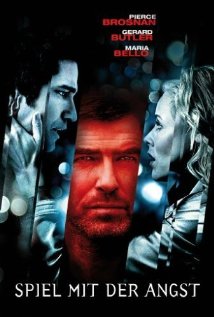
BUTTERFLY ON A WHEEL
UK/US, 2007, 95 minutes, Colour.
Pierce Brosnan, Gerald Butler, Maria Bello, Claudette Mink, Callum Keith Rennie.
Directed by Mike Barker.
Butterfly on a Wheel is a quotation from the poet, Alexander Pope, his Epistle to Dr Arbuthnot, indicating an enormous effort, a small victim, a brutal result.
This film is an interesting psychological thriller. The centre of attention is a successful businessman in Chicago, Neil, played by Gerard Butler. Fate and luck seem to be going his way, a beautiful wife, a lovely young daughter, success in business contracts.
One day, travelling with his wife, a mysterious stranger emerges from the back seat with a gun and all kinds of threats, wanting to know the lengths to which Neil would go to save his daughter. He is certainly put to the test. As the tests progress, his nerves begin to shatter. His terrified wife, Abby, Maria Bello, seems to be able to remain calmer than Neil.
The tests include getting money from the bank, all their savings, the mysterious stranger setting it alight, Neil having to stand on the roof of a building despite his vertigo, threats to his wife. Ultimately, his being urged to kill someone to save his daughter.
This does seem very mysterious, especially when the cruel men threatening is played by Pierce Brosnan. But, there is an explanation, a twist at the end – and then a final, at unexpected, twist.
The film has been directed by Mike Barker, a television director whose films include To Kill a King and A Good Woman.
1. A psychological study, thriller? The effect of the twists?
2. The title, the quotation, as applying to Neil?
3. The easy going introduction to Neil and his wife, at home, love for their daughter, husbands and wives love, the light touch, the gift, seeing Neil off? At work, his success, the contracts, the bosses of the discussions, luck? The presence of Judy? All going well?
4. In the car with his wife, going to an alleged business meeting, Abby going to meet her sister? The shock with Tom in the back of the car, the gun, his appearance? The mystery?
5. Tom, anonymous, the audience seeing him on the roof of the building with the binoculars, his character, cruelty, threats? Attitude towards Neil? Abusive? His treatment of Abby? The variety of tests, asking what lengths Neil would go to save his daughter? The phone calls to his daughter, the babysitter and hiring her? Suspicions? Going to the bank, Neil nervous, the parking issue, Abby getting the money? Tom and his burning the money? Neil’s shock?
6. Becoming more frantic, his nerves? Abby to bring the envelope, Neil watching, phoning her, asking her not to deliver the envelope? Accusations of fraud?
7. The babysitter, the call, the questions?
8. In the hotel, entering the room, Tom catching them, Tom and his advances, Abby changing into the red dress? Tom taking Abbey?
9. Coaxing Tom on to the roof, his vertigo, his standing?
10. Neil going to the police, his explanations, the police and reassuring that his wife had come and said that this would happen?
11. Going to his destination, Tom giving him the gun, to kill the person inside, Neil and his encounter with Judy, the audience not knowing about the affair, Neil and his reaction, being taunted, pulling the trigger, there being no bullet? Tom as Judy’s husband, the photos on the mantelpiece?
12. Tom’s revenge, explanations?
13. Neil and his like his wife, going back, the revelation of her planning, setting him up, the manipulation, her pain and his experiencing it?
14. Effective as a psychological thriller, twists and their effect?
Published in Movie Reviews
Published in
Movie Reviews
Tagged under
Saturday, 18 September 2021 19:53
Life Itself
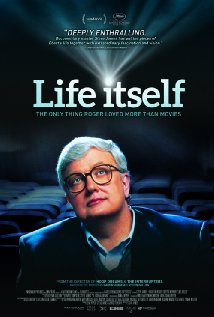
LIFE ITSELF
US, 2014, 120 minutes, Colour.
Roger Ebert, Chaz Ebert, Gene Siskel, Marlene Siskel, Werner Hertzog, Errol Morris, Ramin Bahrani, Gregory Nava, Martin Scorsese.
Directed by Steve James.
Life Itself is an exuberant title for an autobiography. It was the title that celebrated film critic, Roger Ebert, chose for his. And it is the title chosen for this biographical portrait as well as tribute to him.
There is some irony in this because in the years of the making of the film, Roger Ebert was often hospitalised, having a cancer of the jaw which disfigured his face, eventually prevented him from speaking except through a computerised voice. Which must have been great difficulty, despite his evident cheerfulness, because his voice was louder than life. Ebert himself, his wife, Chaz, felt that it was important for audiences for the film to see him as he was, healthy and active in his past life, confined and so disabled in his last years. There are many hospital scenes, no shirking the reality of illness – which does make some of the sequences difficult to watch but makes the audience fully aware of the reality of cancer and its consequences.
Life Itself does show Ebert’s life. He was born in Illinois, affirmed by his parents, wanting to go to Harvard but having to settle for a local university, editing the paper, showing, at 21, a talent for news and social comment, and not only participating in the production of the paper but even delivering it! It was an opening at the Chicago paper in 1967, when the film reviewing column fell vacant, that Roger Ebert took it on, found that he enjoyed it, and continued reviewing for almost 45 years.
When he had the opportunity to appear on television, audiences responded to his reviewing and his style, his wide range of interest, appreciating so many genres and conventions, and eager to communicate his views. For many years was on television with Gene Siskel, younger than Ebert, not agreeing with everything that Ebert said – and there are quite a number of clips of their on-screen reviewing as well as some cutaways to their arguments, sometimes squabbles. Siskel was to die comparatively young – and his wife is one of the talking heads throughout the film, commenting that with the two of them arguing it was really like young kids going at each other.
There is a lot of information, the fact that Ebert wrote the screenplay for the exploitation film, Beyond the Valley of the Dolls in 1969, his visits to the Cannes film Festival, his meeting with a variety of directors as well as of the producers of his program. many of them appearing here as talking heads, or with something interesting to say – including directors Errol Morris, Gregory Nava, Ramin Bahrani, Werner Hertzog and, especially, Martin Scorsese.
Ebert and Siskel connected strongly with the public and, with their characteristic logo “Two Thumbs Up”, they alerted their viewers to many interesting films.
While there still some on-screen reviewers, they are, perhaps, a dying breed – Margaret and David , no surnames needed, have ended 28 year commitment to review on Australian television. Nowadays, it is radio, website or blogging. Which is what Ebert himself did, blogging, until his death in 2013.
A must for anybody interested in popular cinema – and an interesting and warm documentary for many audiences.
1. The reputation of Roger Ebert, the portrait of his life, career, personality? His interest in film, writing, television review, partnership with Gene Siskel, promotion of film and film-makers, his long illness, death?
2. Ebert’s autobiography, Life Itself, an affirmation of life? The variety of chapters and the quotes in the film?
3. The early introduction to his illness and death, making the portrait real, the visuals of his face, the cancer, its effect? His need for a computer to communicate? The computerised voice? His relationship with Chaz, her care for him, the family? The scenes in the hospital, the staff, the treatment, the years, his not wanting to be revived? His comparatively young age?
4. The information about Ebert, the range of photos, especially from his childhood? The narrative, from Illinois, his relationship with his parents, his education, their affirming him, writing, wanting to go to Harvard but going to the local university, writing for the paper, editing it at a young age, his interest in politics and social comment, the assassination of JFK, involved in the paper, even delivering it? His associates? The achievement?
5. The range of talking heads throughout the film, Chaz, producers, film-makers, range of friends, directors like Gregory Nava Ramin Bahrani, Werner Hertzog, Errol Morris, Martin Scorsese, the range of producers?
6. Chaz, mixed racial relationship, the children, seeing her in action?
7. His beginning to write reviews, the opening of the Chicago paper, not having special qualifications, but writing well? 1967? His interest with Russ Meyer, writing Beyond the Valley of the Dolls? The clips? So many people surprised afterwards that he wrote this film?
8. The meeting with Gene Siskel? Siskel’s wife comments throughout the film, the assessment of her husband, of his relationship with Roger Ebert, the competitiveness? Siskel’s personality? Working together, the comment that they were like wto kids? The clips from their programs, the cutting to their discussions, Ebert and his being pedantic? The quality of their reviews, comments, talk? The symbols of the thumbs up?
9. Siskel, his age, illness, keeping it a secret, his death? The blog tribute to Siskel?
10. Ebert in Cannes, the discussions with directors, promotion, Scorsese’s comments?
11. His being reduced blogging, his loving it, the effect?
12. The permeation of the film with his love and knowledge of cinema? Not highbrow, but appreciating the range of film and styles?
13. The director of this documentary, his list of questions, Ebert’s replies? Ebert’s praising the director?
14. An interesting documentary, warm and human as well as informative?
Published in Movie Reviews
Published in
Movie Reviews
Tagged under
Saturday, 18 September 2021 19:53
Cube
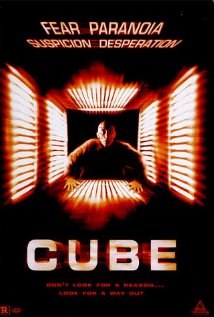
CUBE
Canada, 1998, 90 minutes, Colour.
Maurice Dean Wint, David Hewlett, Nicole de Boer, Nicky Guadagni, Andrew Miller, Wayne Robson.
Directed by Vincenzo Natale.
The Cube series has a special place in regard by horror buffs, solvents fiction buffs, terror fill buffs.
The first film takes place entirely in a giant cube, in moving rooms which have cube designs everywhere. Each cube has cube designs as well as doors which can lead to safety with the right interpretation or to disaster and death. A group of people find themselves in the cube, sometimes cooperating, always with the will to survive, with a dominant policeman, Quentin, taking charge but ultimately becoming a destroyer himself. And the end of the film is quite nihilistic.
The second film is situated in a cube which is called a hypercube. Once again there is a group of strangers, sudden deaths, moving rooms. Once again, the group help each other, clash with each other, some killing some of the others. However, this time there is an explanation, a focus on a large weapons factory, and experiments, and the elimination of those who do go the tests.
The third film, Cube Zero, goes once again inside the cube but it is the story of rescue, with some scenes outside the cube but offering some interpretations of explanations of the whole series..
1. A terror film? The ingenuity of the ideas in the screenplay? Science and mathematics? The story of survival and fight the survival?
2. The title, the visuals, the various cubes, the art and design, colour? Beauty and death? The shutters, the various rooms, traps, initial slicing of the man, violence with sound, the moving rooms, the bridge?
3. The people trapped, the movement of the rooms, leaving the rooms, possibilities?
4. The prologue, the man, venturing into the room, being sliced?
5. The groups there, how, wearing uniforms and nametags?
6. The variety of interactions, friendship, hostilities, changing, exploiting the situation, rage, confrontations? Hurt, deaths?
7. Rennes, escaping from so many prisons, his confidence, the destruction of his face – and his later reappearance?
8. Quentin, in himself, police background, wife and children, separation, his story, his pride in being able to read people, race issues? His anger and range? His response to the maths and numbers? His irritability with Kasan and his disability? The antagonism towards Worth? His taking charge, irritable
with Holloway, a clash, telling each other of the truth, his dropping her? His antagonism towards each of the characters, attempting to kill? Murder and his death?
9. Worth, cynical, slack, the architect, building the outer cube? The antagonism with Quentin? His death?
10. Holloway, the background, doctor, doing pro bono work, helping Kazan, clash with Quentin, the strong argument, his dropping her?
11. Leaven, student, seeming unobtrusive, knowledge, the issue of prime numbers, the change to understanding the numbers as positioning the rooms, the permutations? Helping, Kazan, character? With Worth and the suddenness of her death? Seemingly random?
12. Kazan, disabled, hitting his head, crying, causing anger in the others? Autism, his being silent, his cry leading to dangers? His information about the factors and the group being able to get through the exits?
13. The moving rooms, the return to the original room? Progress, stopping, waiting, death? No Exit?
14. An artificial world, an allegory about human existence, No Exit? The beauty, yet the traps, deadly? Any overall control and intelligence? Human nature,
survival, the urge to kill to survive?
Published in Movie Reviews
Published in
Movie Reviews
Tagged under
Saturday, 18 September 2021 19:53
Expatriate, The/ Erased
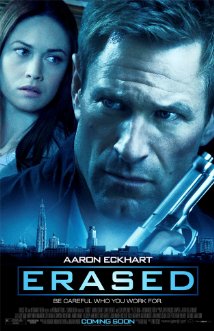
THE EXPATRIATE/ERASED
US, 2012, 100 minutes, Colour.
Aaron Eckhart, Liana Liberato, Olga Kurylenko, Garrick Hagon.
Directed by Philipp Stolzl.
The Expatriate is an interesting, often exciting, CIA thriller.
A number of the settings are in Belgium, in Antwerp and in Brussels. There are also scenes at the CIA centre at Langley.
Aaron Eckhart portrays a former agent who has taken on work at a design company in Belgium, wanting to leave his past behind him, conscious of his having been a hired assassin. His wife has left but his teenage daughter, Liana Liberato, is with him in Europe but resenting it.
Thinking that the contract has been a success, he goes to his office only to find that everyone has disappeared, then finding a number of associates who have been murdered. He goes on the run with his daughter, getting some help from a friend at school, belonging to a Muslim family. Once again, there are killings.
In Langley, a superior played by Olga Kurylenko, who has had a liaison with Eckhart the past, comes to Europe to control the situation. However, with information gathered, it emerges that there is a conspiracy, favouring a wealthy shipowner who has run into difficulties with deaths at sea and smuggling.
The film works well, all the elements come together, the final confrontation, betrayals, abduction of his daughter, but a dramatic resolution.
1. CIA thriller, European settings, Langley? Covert operations? Assassins?
2. The title, the focus on the expatriate? The alternate title, Ben and his life being erased?
3. The Antwerp setting, Brussels, the landmarks, atmosphere, centre of the European Union? American operations? CIA vaults?
4. Ben, the expatriate, his work in Antwerp, security and the demonstrations, security and the building? His past, gradual revelation of his CIA work, assassin? His relationship with his wife? Amy, the tensions, the teenager, the arguments, her past at home, with her grandfather? Not wanting to come to Europe? Amy and her friends, the young Arab man? The winning the photography award? Her father arriving late?
5. The prologue, the vault, the stealing of the CIA documents, the consequent violence? The many killings?
6. Ben’s assistant, noticing the error in the code? Derek and the demonstrations? Ben in the office, the security guard, going home?
7. The return, the completely empty office? Going to the morgue, his dead colleagues? Writing down the reference to the patent? The assassin in pursuit, the car and the crash, Ben and Amy escaping? The wounds and the guns? Going into the house, empty, tending the wounds? The key, going to Antwerp station, finding the dossier?
8. The truth about Ben, his relationship with his wife, the reason for Amy being with him, his wanting to change, conscience?
9. Gathering information, going to the building, the disconnected phone, making the link, the CIA? Anna in Langley, the contact with Derek, her not wanting the deaths, her being on the payroll of Halgate? The meeting in Langley, the decision, going to Belgium?
10. Ben and Amy, being pursued, going to Amy’s friends, the man arranging for somewhere to stay, the assassin and his killing this man?
11. Anna, Ben, the past, the plan going awry? The visits to Halgate, his sinister assistant? Ruthlessness? The situation with the ship, cargo, the deal with the CIA, supplying arms to Mozambique? The accident, the deaths? The mother and their suit against Holgate, the appearance in court, accepting the deal?
12. The hotel sequence, Derek in the room, Ben confronting him, the violence, the documents, Derek killing himself? Anna and the pursuit, men and Amy eluding the pursuit?
13. The assassin, killing the Arabs, taking Amy?
14. Ben, the plan, reading the documents? Preparing the case with the documents, the bomb? The meetings, the deal with Halgate? Seeing Amy safe, the motorbike with her friend? The case, the assassin with him, and giving him the extra document to go to the car, all dying in the explosion?
15. The perennial problem with CIA stories, ethics and morality? Ben and his future?
Published in Movie Reviews
Published in
Movie Reviews
Tagged under
Saturday, 18 September 2021 19:53
Blood
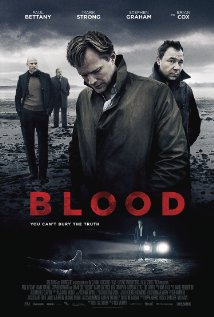
BLOOD
UK, 2012, 92 minutes, Colour.
Paul Bethany, Mark Strong, Brian Cox, Stephen Graham, Ben Crompton, Natasha Little, Adrian Edmondson, Nick Murphy.
Directed by Nick Murphy.
Blood is an interesting drama. It is a police drama, based on a television series on the BBC in 2003.
The focus is on two brothers who are policeman, influenced by their father, now retired with touches of dementia, who was also a significant policeman in the Wirrell. The main brother is played by Paul Bettany, a versatile actor, who has failed in a previous investigation and feels guilt, and impelled to hunt down murderers. He seizes an opportunity when a schoolgirl girl is murdered and a listed paedophile is suspected. He brutalises the suspect, killing him and burying him. The man is innocent. The complication is that his younger brother, who looks up to him, is asked to participate but is troubled by his conscience and eventually reveals the truth.
He is played by Stephen Graham. Impressively present, as always, is Brian Cox as the father who is more alert to the situation than anticipated.
Also present is the police officer, strict, wanting to find the truth, played well by Mark Strong.
The film is quite brief, moves with some pace, creates strong characters, puts them in difficult situations, especially with moral dilemmas.
1. The title? Based on a television series, Conviction? Blood and death, the killing of Jason? Blood relationships, father, rivers?
2. The Wirrell, the English coast, the island, the town, police officers, homes, pubs, the church? Authentic feel? The musical score?
3. The opening with the murder, the young girl, her age, being found, the three police, the suspicions of Jason as a paedophile, his record? Going to the church, looking to him, the interrogation, his mental condition, his lies about the girl, about the chain? The official interrogation, the window and all the staff watching? The chief, having to release Jason, lack of evidence?
4. Joe as the centre of the story, in himself, his relationship with his wife, his daughter? His father and caring for him, the Alzheimer’s? His mistake in the past case, his guilt, embarrassment? His father commenting on this? His relationship with his brother, Chrissie, the memories of the coast and buttoning their coats? Working with Robert, diligence? Desperate for a conviction, the presumption of Jason’s guilt, going to the church, taking him, angry at his release? Abducting him, getting him to dig the hole on the island, making him lie in it, brutalising a confession, hitting him with a shovel, Jason’s death, burying him? Chrissie present, the father in the back seat? Joe and his being disturbed? The wife, the anniversary, the tension, the drinking? Covering up the killing?
5. Chrissie, the younger brother, his police work, admiring Joe, his girlfriend, the celebration, engagement party, the abduction, his watching, reaction? Uncomfortable with Joe? Helping Jason’s mother and Joe being upset? Telling the truth to his girlfriend?
6. Robert, strong police work, lacking relationships, people trying to set him up, his response? The case, his concern about Joe?
7. The boy, in the old cinema, the discovery of the truth, the boys murdering the girl?
8. The father, wandering into the office, Alzheimer’s, the memories of his wife, of his boys? His drinking? Being in the back of the car, the U pass, later and his wanting to take the blame?
9. Joe moving the body, the search on the island? Joe at home, his daughter’s reaction, his wife?
10. The effect of Joe’s guilt on everyone? Disappointment, disillusionment?
11. The finale of Joe walking towards the island in the water?
Published in Movie Reviews
Published in
Movie Reviews
Tagged under
Saturday, 18 September 2021 19:53
Green Prince, The
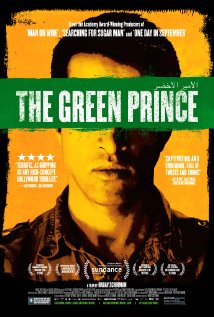
THE GREEN PRINCE
Israel, 2013, 101 minutes, Colour.
Mossab Hassan Youssef, Gonen Ben Yitszhak.
Directed by Nadav Schirman.
Sounds like the title of a fairy tale. But, this is no fairytale.
Rather, The Green Prince, is the code name for Mossab Hassan Youseff. He appears throughout the film, mostly in a straight-to-camera response to an interviewer. Mossab is the son of one of the founders of Hamas – his father is seen speaking to the crowds in some television footage. Mossab is a son of Hamas and supported the movement until he was taken by Shin Bet, questioned, tortured and persuaded to become an agent for Israel.
It is interesting to note that this theme was used very effectively in a recent Israeli fiction film, Omar.
We have 90 minutes to attend to Mossab, his early life, the pressure on him to work for Israel and the lengths to which Shin Bet went to to ensure that he was not found out and that he seemed a passionate Palestinian. Israeli military even went into his home, terrorised his mother and then exploded devices in parts of the house.
The other person who is interviewed is Gonen Ben Yitszak, genial compared to Mossab’s serious demeanour, who explains his own Israeli background and his studies and being seconded to Shin Bet. Gonen was Mossab’s controller for over a decade, leading to apprehension of Hamas leaders.
There are many realistic television footage sequences inserted into the two interviews.
The film takes a turn when Mossab leaves Israel and goes to the United States, living in San Diego, even writing a letter to his father explaining the situation and urging him to denounce his son publicly and what he has done, so that there would be no recriminations on him or the family. The final credits indicate that his family have had no contact with Mossab.
Mossab is alone in San Diego when, unexpectedly, Homeland Security agents take an interest in him, apprehend him, wanting him to be deported, basing this on his early, teenage action with Hamas, not giving any credit to his years as an Israeli agent. This situation touches Gonen and he decides to go to the United States and make a case for Mossab, even asking Shin Bet about going – but they do not reply which he takes as a silent assent to what he is doing. Yet, it is a risk.
The last part of the film shows Mossad in the United States, living a lonely life contrasting with Gonen, married with three children, a lawyer in Tel Aviv.
The style of the film is not highly imaginative or cinematic, geared more to television documentary style. But it is the intrinsic interest in the characters, in the work of Israeli spies and what this might mean for the peace process between Israel and Palestine that keeps the attention.
1. An Israeli documentary? characters, events, Israel – Palestine? 21st-century issues?
2. The start of the film, talking heads, the long interviews, the focus on each of the characters? Their interactions?
3. The narrative, Mossab, his motivation, Mossab’s father, the film of the 70s, his speeches, attitudes towards Israel? Mossab being taken tortured, age 17? Becoming an Israeli agent for over a decade? His cover, the consequences?
4. The film’s perspective on Israel, attitude towards Hamas, the West Bank? Possibilities for peace, collaboration, saving lives? Betrayal?
5. Mossab and the interviews, his explanation of himself, his clear speaking, his place in the family, his relationship with his father, his father’s prominence in the months? The different scenes, the family, his being taken and tortured? the deal? The cover, the invasion of his home, the explosion, Palestinians believing he was faithful? His work, leading to Hamas leaders and their apprehension? The effect on him? On Israel?
6. Gonen, in himself, the interviews, the genial personality, explanation of his life, his being part of Shin Bet, the torture sequences, turning Mossab, controlling him over the years?
7. The end, Mossab having to go overseas, his identity, in San Diego, the message to his father to denounce him, and the family never acknowledging him?
8. The American authorities, Homeland Security? Confining him, their attitude towards him because of his belonging to Hamas not taking account of his change?
9. Gonen, his moral decision, asking Shin Bet and their not responding? Going to San Diego, giving the testimony? His friendship Mossab? His speculation that Shin Bet did not answer but acquiesced in his going to America?
10. The Americans dropping the charges, Mossab staying in the United States, alone, question, the regular contacts with Gonen? Gonen and his family, children, lawyer in Tel Aviv?
11. The effect of audiences watching this, Israelis, Palestinians, beyond Israel and Palestine?
Published in Movie Reviews
Published in
Movie Reviews
Tagged under
Saturday, 18 September 2021 19:53
Best Man's Holiday, The
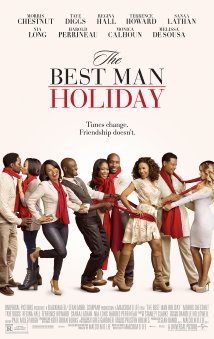
THE BEST MAN'S HOLIDAY
US, 2013, 123 minutes, Colour.
Monica Calhoun, Morris Chestnut, Melissa De Sousa, Taye Diggs, Regina Hall, Terrence Howard, Sanaa Lathan, Nia Long, Harold Perrineau, Eddie Cybrian.
Directed by Malcolm D.Lee.
The Best Man’s Holiday is a rather belated sequel to The Best Man, released 1999.
While the film has African- American cast an appeal to an African- American audience, it is nevertheless an entertainment, with reflection, for a wider audience.
This sequel introduces the same characters, with a collage at the beginning to remind audiences of the original film, and then sets them in new directions around Christmas. Taye Diggs is the successful author now with writer’s block. He is concerned about his wife as they are having a child by artificial insemination. On the other hand, there is the footballer, Morris Chestnut, whose wedding it was in the original film - but his wife slept with the author. There has been hostility ever since, with the author now being advised to write a biography of the footballer. Also along is a pleasant character who is involved in fundraising, and his wife who, it is revealed, was a stripper before her marriage. There are also the outsiders, one cynical, one sexually active. There is a difference in this film with the black publisher in a relationship with a white boyfriend.
The characters were created by Malcolm D. Lee who directs again, obviously with the great familiarity with his characters, the cast drawing them with some insight.
1. The popularity of the original film in 1999: characters, like stories, the wedding, betrayal’s infidelity, the consequences?
2. 14 years later, 21st-century life? The opening, collage and the re-introduction of the characters and their situations?
3. An African American story, characters, crises, middle-class characters, wealth? Comparisons with the white community? Links?
4. The Christmas setting, the holiday, homes and mansions, deals for writing books, offices, football and sport situations, outings, Christmas songs, the musical score?
5. Harper, the attempts for his wife to become pregnant, in vitro methods, the need for finance? The success of his book, the new manuscript, the editor turning him down? His fears about the future, the baby, finance? Going to see Jordan, the talk? The possibility of doing a biography, keeping quiet about it but accepting it? Making notes, finding a title? The meeting? The clash with Haper’s dalliance at the time of the wedding, his wife and the sexual relationship? The years passing, attention, not wanting to meet Lance? Robin, her concern about her pregnancy, with the other women, Jordan and the touch of jealousy?
6. Jordan, job, her relationship with Brian, his being quiet? Her bond with the rest of the group? Brian going to the holiday reunion? Concern? His having to leave for his own family, his return?
7. Lance, sports reputation, achievement, the critiques? His wife, the children? His wife’s illness, keeping it secret? The women responding to her illness? Harper’s response? Her cheerfulness, keeping going, bed-ridden?
8. Julian, his job, the charity, raising money? The video of his wife, as a stripper? His response? His love for his children? Clashes with his wife, her anger, memories of the past? The clash with Shelby, Candace’s suspicions? The compromise, Shelby offering money?
9. Quentin, the observer, man about town, free, interactions with Shelby, kids, the affair, possible marriage?
10. Shelby, her style, the divorce, her daughter and humiliating, brash, clashes, rivalries, jealousies, Julian, but with Quentin?
11. Happy sequences, the meals, the song and dance routine? The outings, church?
12. The background sport, Lance’s reactions, the commentators, his playing? Everybody watching?
13. Harper and Lance, understanding, reconciliation, the collaboration?
14. Time passing, the success of the biography, individuals happy – and the possibility for a sequel?
Published in Movie Reviews
Published in
Movie Reviews
Tagged under